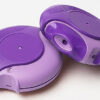Browse This Article
Avoid Asthma Triggers
Freshly cut grass, a friendly puppy or a dusty rug is all it takes to set off an asthma attack for Olga Cerini. “My asthma is allergy-based,” says Cerini, who lives in New York City. But she is able to keep her asthma under control, she says, because—in addition to her medications and years of allergy shots—she is careful to avoid these triggers.
For example, “In my home, we have no rugs because rugs are a horrible source of dust,” she says. “We clean frequently with a damp cloth, use either synthetic or cotton bedding, and vacuum the furniture and curtains very often.”
Asthma Medication Side Effects
Asthma cases are on the rise. About 8% of the US population has asthma, according to the Centers for Disease Control, compared to 7% in 2001. A range of medications are used to treat asthma and many have serious side effects, like nervousness, anxiety, increased heart rate, hyperactivity, headache, nausea, difficulty breathing and swallowing, and swelling of the throat. Please see Backgrounder for full list of medications and their side effects.
Lifestyle Changes to Control Asthma
If like Olga, you or your child suffers from asthma, eliminating triggers is just one of the things you can do to help control symptoms. Other lifestyle changes can help reduce the incidence and severity of attacks yet many asthma sufferers rely on one or more type of medication, according to Angel Waldron, a spokesperson for the Allergy and Asthma Foundation of America. “Medication and lifestyle changes are equally important. Asthma cannot be properly managed without them both.” Since every case is different, be sure to talk to your doctor before embarking on a plan to control your asthma.
Your doctor will evaluate your symptoms and perform a lung-function test to determine the best course of treatment for you. If your symptoms are intermittent and mild, he may prescribe an inhaler to be used only when needed. If your symptoms are more frequent and severe, you may need daily medication to manage your asthma. For children, asthma attacks can be more severe because their airways are narrower, according to the National Library of Medicine. Some children who wheeze when they have a viral illness may eventually outgrow these symptoms as their airways mature. But for many others, lifetime management is necessary, according to the American Academy of Allergy Asthma and Immunology.
Managing your lifestyle won’t eliminate your need for medications—but it will reduce attacks and help your medicine work more effectively. Here are some steps you can take to control your symptoms:
Know and avoid your triggers. For as many as half of all asthma patients, the trigger will be an allergen, as it is for Olga, says Waldron. For others, it may be something else, such as exercise or exposure to cold, dry air. Work with your doctor to identify your triggers and avoid them as much as possible. (See Asthma Fast Facts for a list of the most common asthma triggers.) While it may be hard to avoid common triggers, it is worth the effort, says Cerini, “since your health is most important.”
Try a dairy-free trial. For some people, food sensitivities can “set off an immune process in the gut that causes inflammation,” says Evangeline Lausier, MD, of Duke Integrative Medicine in Durham, NC. When this inflammation affects the airways, it can cause an attack, she says. Because dairy is one of the most common culprits, Lausier recommends cutting it out for one month. During this time, keep a diary of your symptoms. If you see an improvement, talk to your doctor about continuing on a dairy-free diet.
Ask your doctor if any of the following foods can be triggering your asthma:
- Eggs
- Soy
- Wheat
- Shellfish
- Sulfite additives, used in food processing and preparation.
Seek out “good bacteria.” Probiotics—she says. It can be in pill form or added to a food.
Take your vitamins. Several vitamins that support your immune system and help control inflammation are especially important for people with asthma. They include Vitamins C, D, and E. Most people already get enough C and E in their daily diet, says Lausier, but Vitamin D deficiency is quite common. You can ask your doctor to perform a simple blood test to check your “D” level and recommend an appropriate dose.
And while you are taking those daily vitamins, consider adding a fish oil supplement as well. The Omega-3 Fatty Acids in fish oil help combat inflammation that constricts the airways. Look for one containing two to three grams total of Omega 3, or of DHA and EPA combined.
Keep your nasal passages clear. If you feel stuffed up, try using a neti pot or saline spray to clear your nasal passages. This will reduce strain on your airways by helping you breathe easier—and also cut down on post-nasal drip, which can trigger attacks, says Lausier. If you use a neti pot, be careful to sterilize the water and follow manufacturer’s directions carefully. You may prefer a sterile, over-the-counter nasal saline spray.
Breathe steady. There is some evidence that breathing techniques can help with symptoms of asthma, such as hyperventilation. One 2007 study showed that the Papworth Method, practiced at a hospital in England, improved breathing and mood in patients with mild asthma. It also noted that previous studies have found the Buteyko Breathing Technique and yogic breathing (pranayama) to also be helpful in reducing symptoms. You can find out more about Buteyko from the Buteyko Institute. You can also look for a pranayama instructor in your area. Or, simply download a smartphone app to walk you through the steps. They are available for Android or iPhone.
Pregnancy and asthma. Because asthma restricts breathing which in turn could limit the oxygen getting to the fetus, asthma should be controlled before getting pregnant, if possible. Pregnancy alleviates asthma 30% of the time, increases the symptoms 30% of the time and the last third see no changes in asthma during pregnancy. It’s unclear if asthma itself can cause a birth defect, but it’s likely to be very low.
Asthma medicine in general is considered safe during pregnancy and breastfeeding, but to minimize risk to the fetus as much as possible, many mothers try to stay with fast acting inhalers and inhaled corticosteroids, if effective for the mother. The inhaled medications are absorbed into the body in lower amounts than oral medicines so less should get through to the fetus. For more information, see Asthma and Pregnancy (MotherToBaby) and speak with your health care advisor.
Many asthma sufferers rely on these lifestyle changes to help control their symptoms and avoid common allergy triggers.
Ellen Wlody is a writer who specializes in health and parenting topics. She lives in upstate New York with her husband, children, and two dogs.







